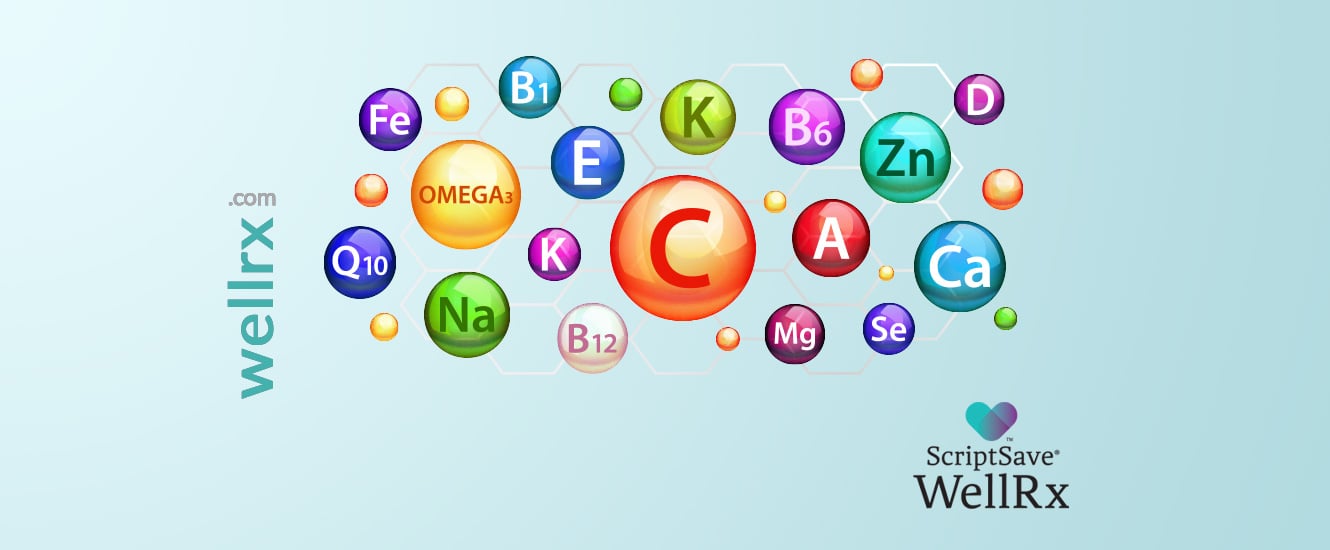On daily basis, our body builds skin, muscle, and bone and operates the whole system through thousands of pathways. Vitamins and minerals are micronutrients, and while relatively small quantities are required for our body, they are essential to make this process possible.
One-third of all Americans consume dietary supplements including Multivitamins/Minerals (MVMs) and the use of supplements has been steadily increasing.1 With this many American’s using MVMs, it may not surprise you that the poison control centers in the United States report 60,000 cases of vitamin toxicity occurring every year.2
Since there are no standard regulations for MVMs, understanding the role of MVMs is necessary to get the most benefit out of taking MVMs supplements and avoid toxicities.
What are Vitamins?
Vitamins3,4 are organic substances and can be broken down by heat, air, or acid. Vitamins can be divided into two main subgroups: fat-soluble and water-soluble vitamins. Fat soluble vitamins are, as the name suggests, better dissolved in fats and excesses are stored in the liver. This means they linger the body for long periods time, which may result in higher risk of toxicity than water-soluble vitamins. Fat-soluble vitamins include vitamins A, D, E, and K.
| |
Vitam#in A |
Vitamin D |
Vitamin E |
Vitamin K |
| What it does? |
Vision protection |
Bone formation |
Antioxidant |
Blood clotting |
| Signs and Symptoms of Deficiency |
Night-blindness, extreme dry eyes |
Softening of bones |
Deficiency is uncommon; neurological problems |
Bleeding |
| Recommended Daily Dose* |
900 mcg |
20 mcg |
15 mg |
g |
*Recommended daily dose is for adults and children aged 4 years and older, and for pregnant/lactating women. For more information is available at https://www.dsld.nlm.nih.gov/dsld/dailyvalue.jsp
Water-soluble vitamins dissolve in water, can circulate easily and are not stored in our body. That’s why the kidney has an important role to regulate the level of water-soluble vitamins, such as by excreting excesses into urine. Water-soluble vitamins include vitamin B groups and C.
| |
Vitamin B Groups |
Vitamin C |
| What it does? |
Function as co-enzyme that help the body obtain energy from food Subgroups: B1 (thiamin), B2 (riboflavin), B3 (niacin), B6 (pyridoxine), B7 (biotin), B9 (folate), and B12 (cobalamin) |
Antioxidant, collagen/connective tissue formation, wound healing |
| Signs and Symptoms of Deficiency |
Overall impaired growth – fatigue, malnourishment, skin disorders, anemia, neurological disorder, diarrhea, or inflammation *B12 deficiency is common in vegetarians (those who does not eat animal products) |
Scurvy (bleeding and swollen gums, loose teeth), impaired would healing *secondary deficiency in alcoholics and/or smokers |
| Recommended Daily Dose* |
B1 (1.2 mg), B2 (1.3 mg), B3 (16 mg), B6 (1.7 mg), B7 (30 mcg), B9 (400 mcg), B12 (2.4 mcg) |
90 mg |
*Recommended daily dose is for adults and children aged 4 years and older, and for pregnant/lactating women. For mor information is available at https://www.dsld.nlm.nih.gov/dsld/dailyvalue.jsp
What are Minerals?
Minerals4,6,7 are like vitamins, but they are different in several basic ways. Minerals are inorganic and hold on to their chemical structure – which means the minerals that you consume from nature, water or foods will find their way into your body easier than the vitamins do. There are about 4000 minerals known in the Earth and 16 essential minerals required for human body.5,6 We’ll just review some more common ones you can find on the market shelves.
| |
Calcium |
Chromium |
Iron |
Magnesium |
Zinc |
| What it does? |
Bone/teeth formation, support for blood vessels, muscles |
Insulin function |
Red blood cell formation |
Nervous system function, contract muscle, protein synthesis |
Wound healing, reproduction |
| Signs and Symptoms of Deficiency |
Muscle spasms, bone disorder, dental problem |
Increasing risk of diabetes |
Anemia |
Tremor, muscle spasms, mental disorder |
Hair loss, diarrhea, skin lesion |
| Recommended Daily Dose* |
1300 mg |
35 mcg |
18 mg |
420 mg |
11 mg |
*Recommended daily dose is for adults and children aged 4 years and older, and for pregnant/lactating women. For mor information is available at https://www.dsld.nlm.nih.gov/dsld/dailyvalue.jsp
What You Should Know About Vitamins and Minerals
The best source to receive vitamins and minerals is food. First, try with a balanced diet. You can build an individualized diet with your dietitian, or you can also find a chart showing the foods containing such vitamins from FDA website4 or NIH website8
- Listen every day what your body tells you and discuss your concern or discomfort with your doctor
- Getting a blood check periodically is a good idea to look at your overall health and prevent any deficiency that may be overlook just by symptoms
- When choosing a supplement, try to avoid those that provide mega-doses of MVMs or have added botanicals whose properties are unknown – “natural” does not mean “safe!”
References:
- NIH State-of-the-Science Panel. National Institutes of Health state-of-the-science conference statement: multivitamin/mineral supplements and chronic disease prevention. Am J Clin Nutr 2007;85:257S-264S
- Gummin DD, Mowry JB, Spyker DA, Brooks DE, Beuhler MC, et al. 2018 Annual Report of the American Association of Poison Control Centers’ National Poison Data System (NPDS): 36th Annual Report. Clin Toxicol (Phila). 2019 Dec;57(12):1220-1413. PubMed PMID: 31752545
- Berdanier, C., Berdanier, L., Zempleni, J. Advanced Nutrition: Macronutrients, Micronutrients, and Metabolism. Boca Raton, FL: CRC Press, Taylor & Francis Group. 2015 Feb
- Food and Drug Administration: Nutrition Facts Label; Vitamins and Minerals Chart, Available at https://www.fda.gov/food/food-labeling-nutrition/changes-nutrition-facts-label last accessed February 6, 2020
- Minerals and Gems. National Geographic. http://nationalgeographic.com/science/earth/inside-the-earth/minerals-gems/. Published Feb 6, 2020. Last accessed Feb 14, 2020
- Essential Nutrients: Vitamins& Minerals. Hemophilia Federation of America (HFA). https://www.hemophiliafed.org/news-stories/2010/11/essential-nutrients-vitamins-minerals/. Published Nov 10, 2020. Last accessed Feb 14, 2020
- American Dietetic Association: Position of the American Dietetic Association: Nutrient Supplementation. J Am Diet Assoc. 2009; 109:2973-85
- National Institutes of Health. Turning Discovery Into Health: Dietary Supplement Label Database, Available at https://www.dsld.nlm.nih.gov/dsld/dailyvalue.jsp/. Last accessed February 14, 2020













 Store & manage your medication list
Store & manage your medication list Medication pricing updates
Medication pricing updates Pill & refill reminders
Pill & refill reminders Medication journal & mood log
Medication journal & mood log